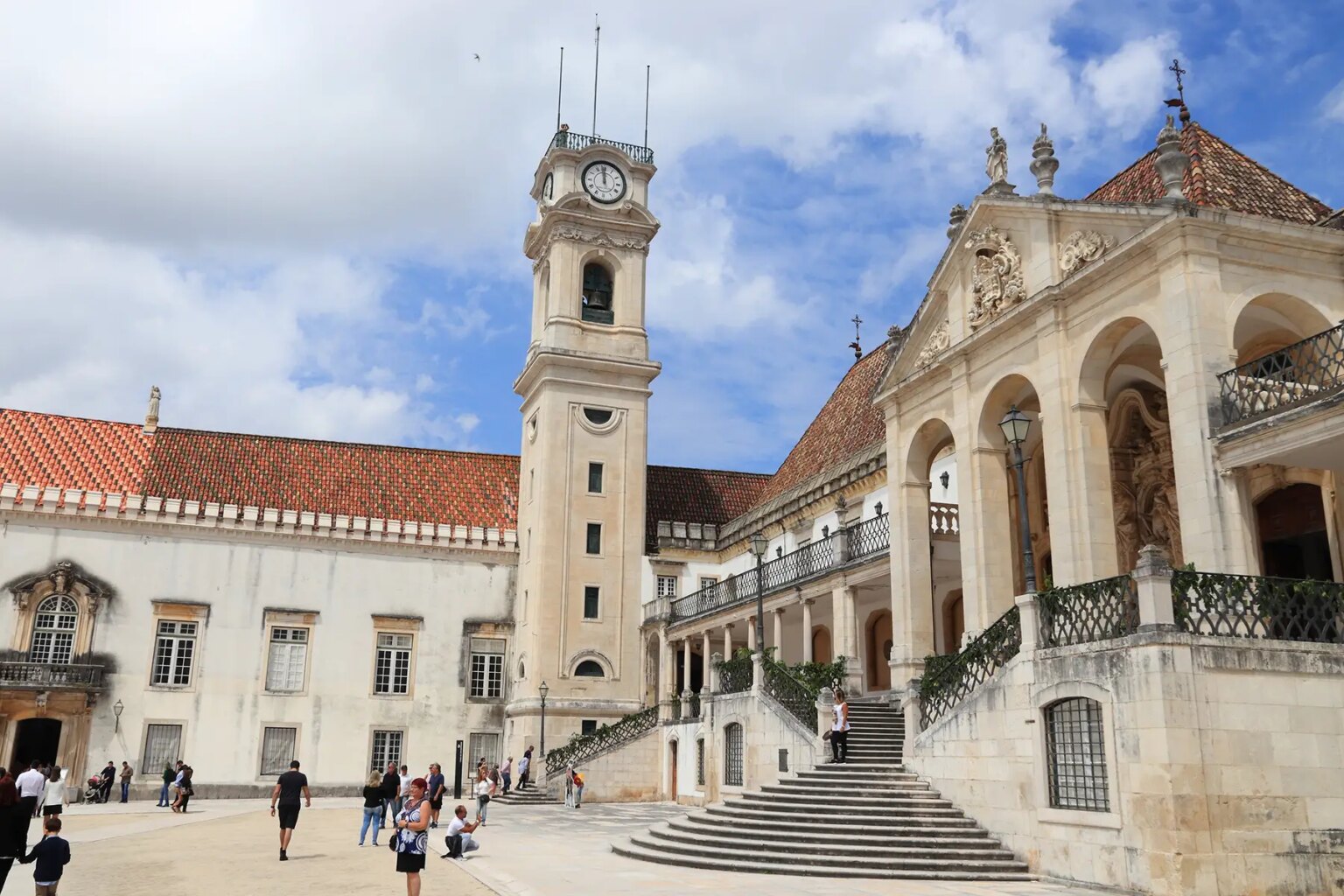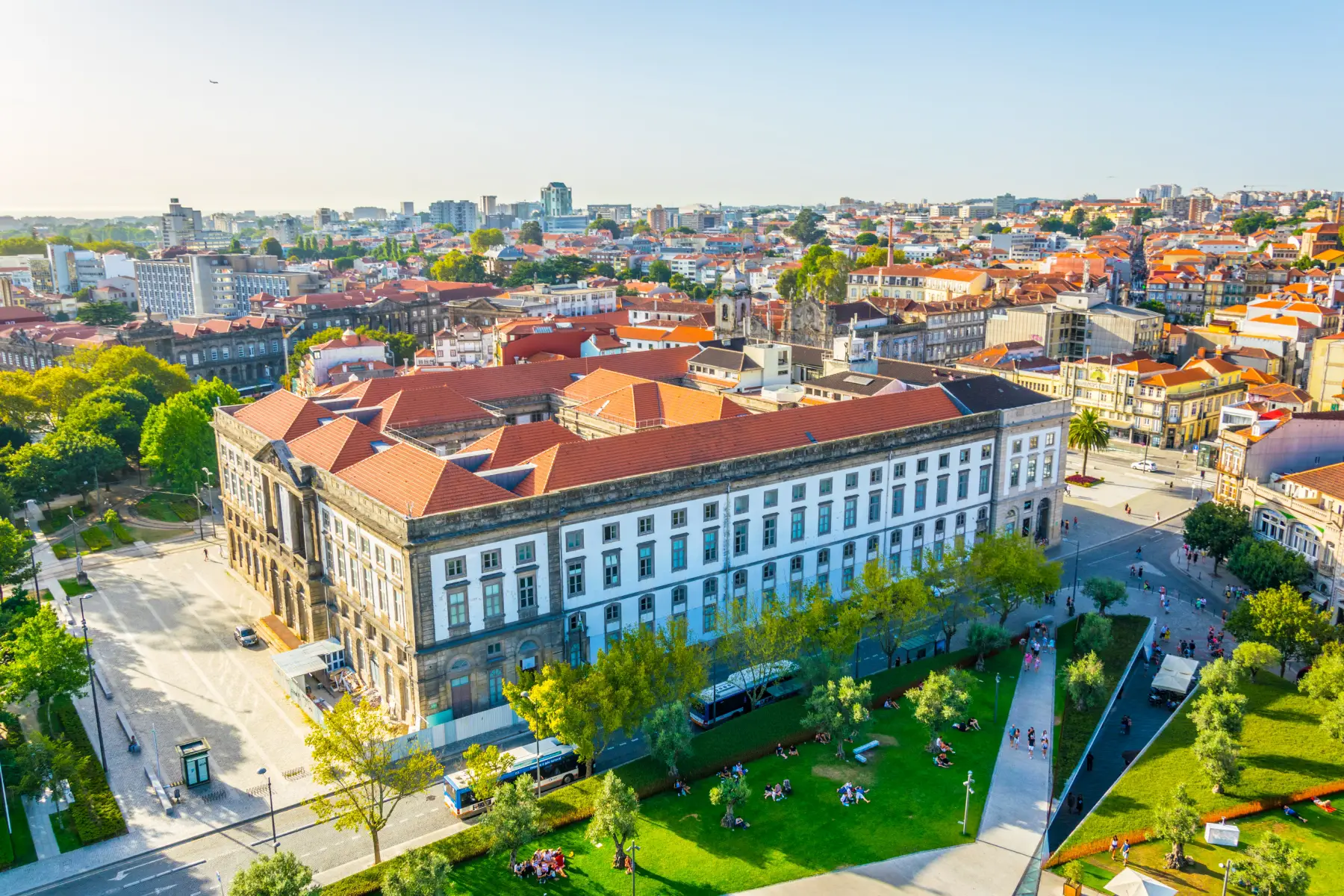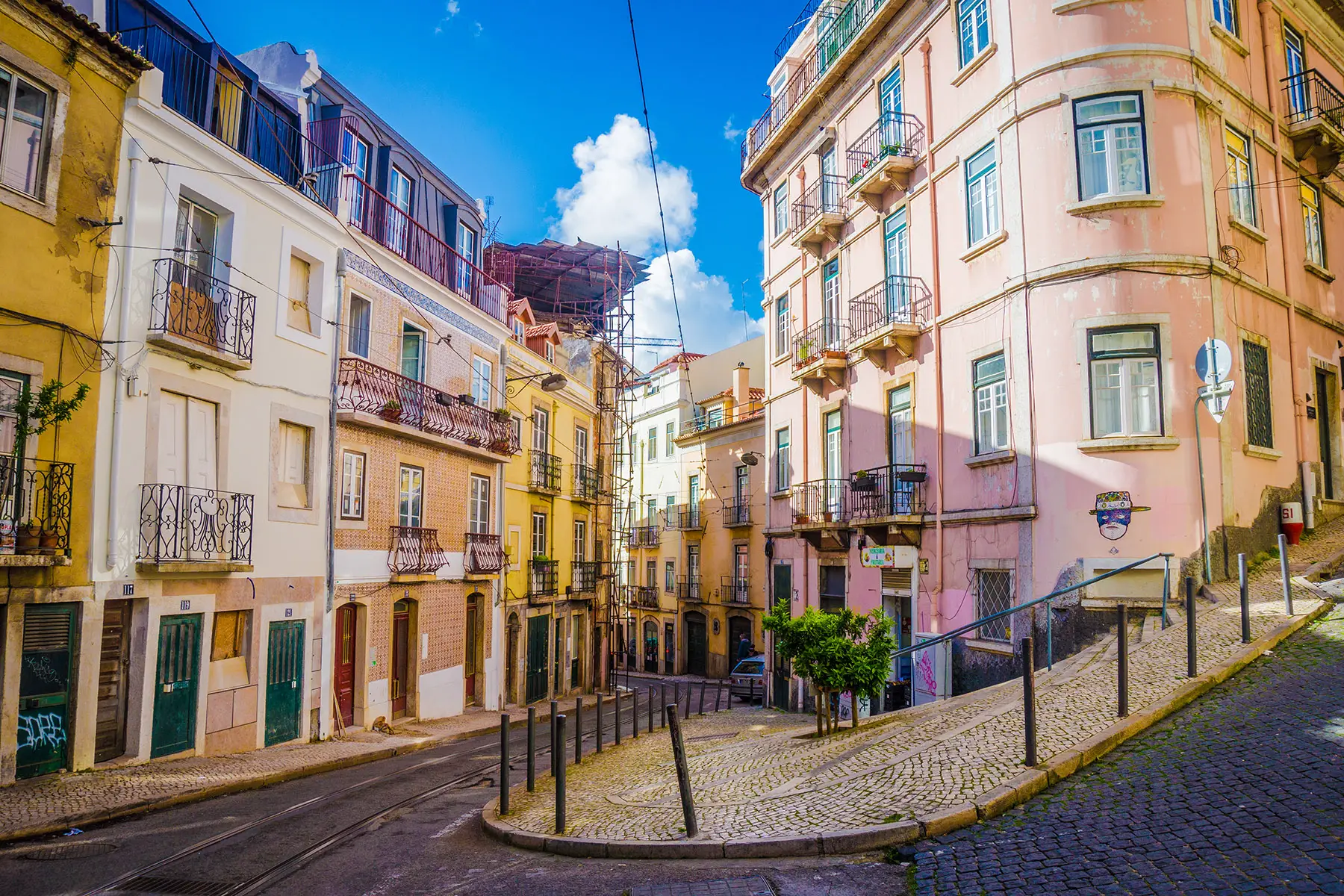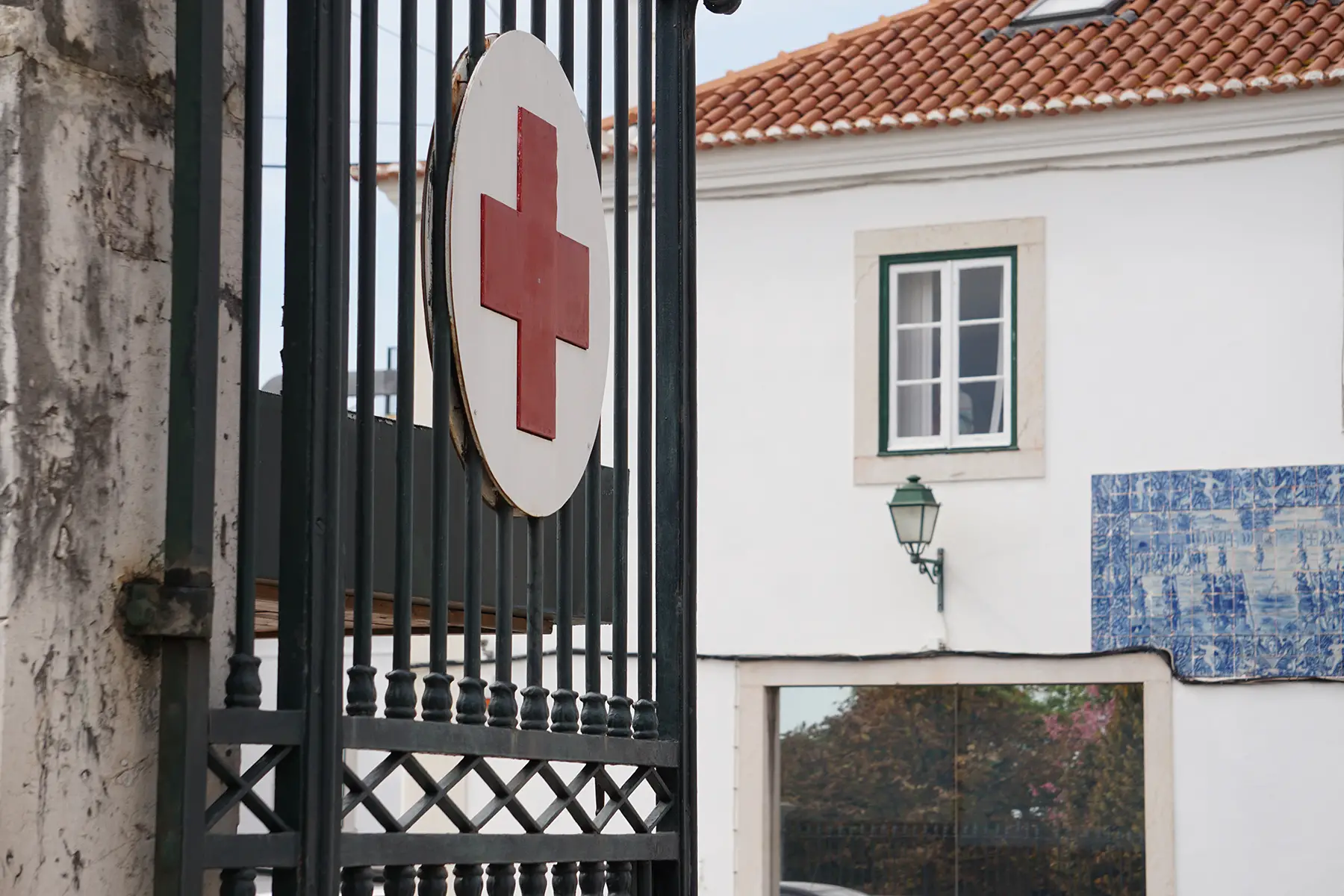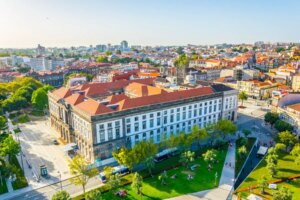Portugal is increasingly attracting more international students. The country’s high standard of living and affordable tuition fees make this an excellent alternative for anyone looking to study abroad. While most universities are located in Lisbon and Porto, there are institutions scattered throughout the country. This includes Coimbra, where you will find the oldest university in Portugal, which dates back to 1290.
If you want to study in Portugal, this article will help you understand the Portuguese higher education system by covering the following topics:
Sirelo
It's no secret that moving abroad can be stressful. Sirelo's team of removal advisers is here to help. They provide five free quotes from international shipping companies so you can find the best options at the best prices. Take the stress out of your relocation to Portugal with Sirelo.
Higher education in Portugal
Portugal has one of the highest numbers of universities in Europe. In fact, there are more than 100 higher education institutions in the country. Only 14 of them are public, and the rest are all private.
Among the best-ranked universities in Portugal are the University of Porto, the University of Lisbon, and the Universidade NOVA de Lisboa. These are organized into different faculties (faculdades) which specialize in a specific area. In addition to universities, there are also polytechnic institutions (institutos politécnicos) and vocational programs available throughout the country.
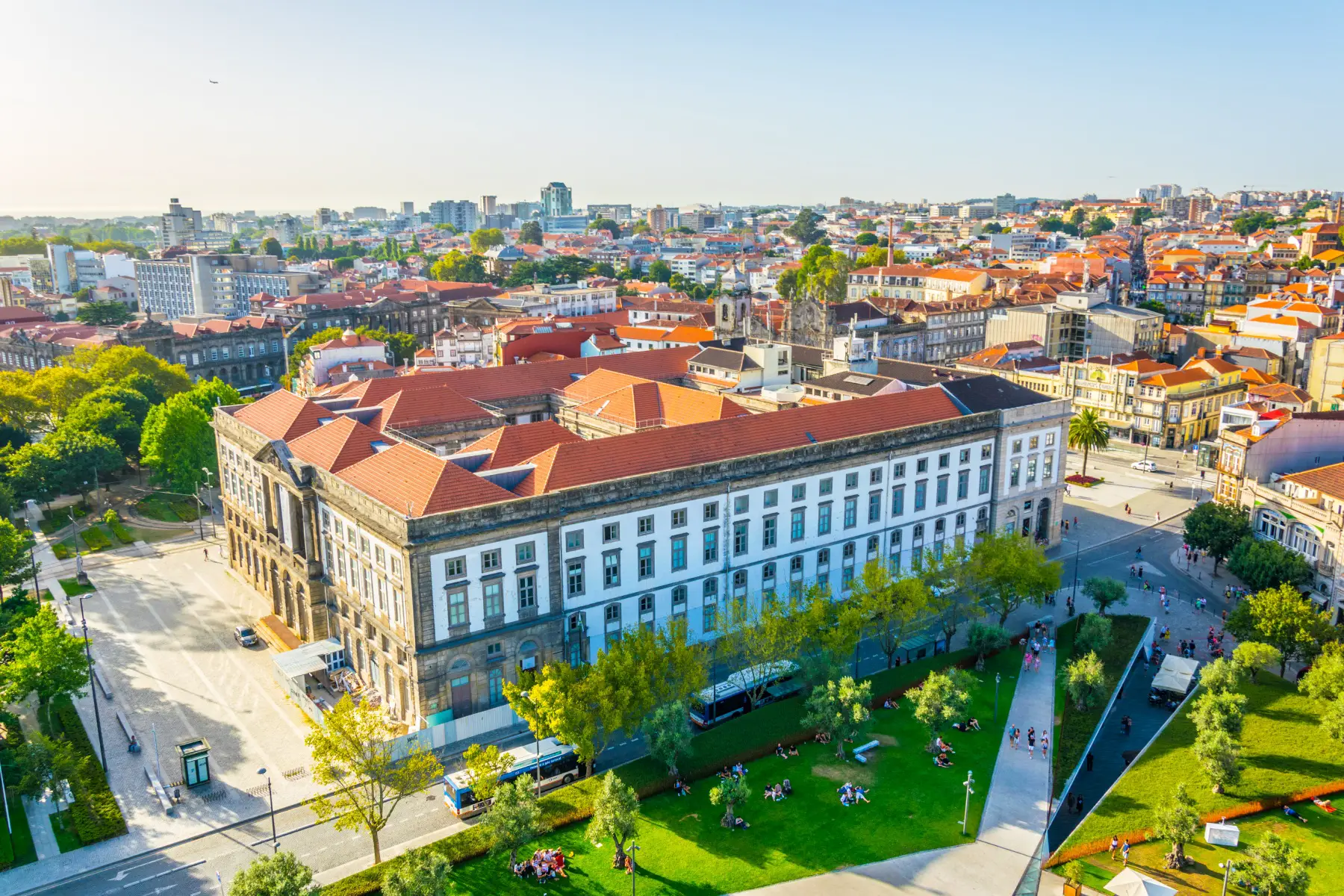
Students in Portugal usually start higher education from the age of 18 or 19, after completing secondary school. The study year is split into two terms: the first semester (which runs from September to January) and the second semester (from February to July).
While most programs are in Portuguese, there are also English-language programs, however, these are mainly on a master’s or Ph.D. level. In addition to these, the Universidade do Algarve offers around 30 degrees in English.
Nearly 70,000 international students attended university in Portugal in 2022. This is significantly higher than a decade ago when there were only around 30,000. Most students come from Brazil, but there are also people from Angola, Spain, France, and Italy.
Degree programs in Portugal
Degree programs in Portugal are divided into three cycles: undergraduate (first cycle), postgraduate (second cycle), and doctoral programs (third cycle). After finishing secondary school, students can apply for a bachelor’s degree (licenciatura), which lasts about three years.
Like most countries in Europe, Portugal adopted the Bologna Process. As part of the reform, universities introduced the European Credit Transfer System (ECTS). Each study year equates to 60 credits (créditos), and students need 180 to graduate.
The entry requirements vary depending on the institution and the type of degree. Typically, you need to have completed secondary school to apply for university. Most places will also require entrance exams (provas de ingresso).
In Portugal, university degrees have limited slots (vagas), meaning that sometimes only the highest-scoring students secure a place. There are also specific quotas for citizens over 23 and international students, which vary according to each degree.
The admission score is usually calculated by adding 50% of the secondary school average with 50% of the entrance exams.
International students must show equivalent qualifications and meet specific language requirements. Notably, students from European Union (EU) countries and those within the European Free Trade Association (EFTA) pay the same as Portuguese nationals, while non-EU/EFTA students usually pay more.
A degree at a public university in Portugal costs around €1,000 per year. However, if you go private, you can expect to pay around €5,000. That said, there are grants and scholarships available to help cover the costs.
Some of the most popular degree subjects in Portugal include:
- Architecture
- Engineering
- Medicine
- Natural sciences (e.g., biochemistry)
Postgraduate programs
Master’s degrees
Master’s degrees in Portugal are part of the second cycle of higher education and usually take two years to complete. Some subject areas such as architecture, medicine, and engineering might be taught as an integrated master’s (mestrado integrado), which combines undergraduate and postgraduate studies.
To apply for a master’s, students must hold a bachelor’s degree or an equivalent Level 6 qualification, as defined by the European Qualifications Framework (EQF). Similar to other countries in Europe, a master’s in Portugal ends with a dissertation. After submitting the paper, students may also be asked to defend their thesis publically to one or two teachers.

Tuition fees for a master’s can range anywhere from €700 to €4,000 a year, depending on the type of university and subject degree. However, for international students, they can start from €2,000.
Specialized postgraduate programs
Some Portuguese universities may offer specialized postgraduate programs (pós-graduação). These last only one year and are essentially specialization courses for those who want to delve deeper into a topic.
The entry requirements are similar to a master’s. However, vacancies tend to be slightly lower. When applying, the university will review the student’s curriculum, any training related to the postgraduate area, and final grades of previous degrees.
Some universities may offer discounts for former students, but generally, the fees are about €1,500 per year.
Doctoral programs
Doctoral degrees in Portugal are known as doutoramentos. These are research-based programs that can take three to four years to complete.
To apply, you typically require a master’s degree or the equivalent of a Level 7 award on the European Qualifications Framework. You may also need to demonstrate any research experience or submit a research proposal.
Doctoral programs in Portugal are generally less expensive than in countries like the UK or the US. The average tuition ranges from €1,500 to €3,000 a year. This tends to be similar for both national and international students. Many universities offer scholarships and other financial support, but competition can be fierce.
Other study programs
Besides undergraduate and postgraduate degrees, there are other types of programs available in Portugal, including diplomas and higher professional technical courses.
Diplomas are shorter-term programs that offer knowledge in a specific field. These are available at undergraduate and postgraduate levels and can last around six months to a year.
Meanwhile, technical courses (curso técnico superior profissional) are usually tied to a specific profession and can take up to two years. These are often available at polytechnic institutions and give a Level 5 qualification.
Generally speaking, these programs are less expensive than other degrees and range from a few hundred euros to several thousand euros per year.
Some of the top institutions that offer diplomas and vocational courses include:
- Instituto Politécnico do Porto (Porto): offers courses on design, tourism, engineering, and technology
- Instituto Superior de Educação e Ciências (Lisbon): covers areas such as business, marketing, and renewable energy
Qualifications awarded in Portugal
As with most European countries, Portugal follows the Bologna Process. This means that universities and other higher education institutions use the European Credit Transfer and Accumulation System (ECTS).
Each degree has a set number of credits that correspond to a different level on the European Qualifications Framework (EQF). This system makes it easier to recognize qualifications between countries and institutions.
Higher education in Portugal has three cycles:
- First cycle (Level 6): An undergraduate degree (Licenciatura) that lasts three years and is worth 180 ECT credits in total
- Second cycle (Level 7): A master’s degree (Mestrado) that lasts two years and is worth 120 ECT
- Doctorate (Level 8): A Ph.D. (Doutoramento) that lasts three to five years and is worth between 180 and 240 ECT
You can read more about the Portuguese Qualifications Framework on the European Commission website.
General requirements to study in Portugal
Visa requirements
Students from EU/EFTA countries don’t need a visa to study in Portugal. However, they still need to register with the local authorities if they are staying in the country for more than three months.
Non-EU/EFTA students, on the other hand, must obtain a Portuguese student visa. In some cases, you may be exempt from needing a visa if you are taking a short course that is less than three months. If you have any questions, you can always contact your nearest Portuguese embassy or consulate.
Language requirements
Most higher education degrees in Portugal are taught in Portuguese and students must show sufficient knowledge of the language to access the program. Generally, this equates to a B2 level on the Common European Framework of Reference (CEFR) scale.
You may need to take Portuguese lessons or take the Portuguese as a Foreign Language exam (PLE) to show your language proficiency. Many universities also offer Portuguese courses for non-native speakers if you need to improve your skills.
Some postgraduate programs are also available in English, but standardized tests like TOEFL and IELTS are not always mandatory.
Getting overseas qualifications recognized
Thanks to the Bologna Process, EU citizens can easily transfer their qualifications to other countries within the European Union. Students from other areas, however, may need to go through extra steps to get their foreign qualifications recognized in Portugal.
Essentially, there are two options: recognition and equivalence. The recognition system compares foreign qualifications to Portuguese qualifications in terms of study level. The equivalence process also considers the duration and content of the degree.

The General Directorate for Higher Education (Direção-Geral do Ensino Superior – DGES) is the official body responsible for reviewing each application. To apply for degree recognition (reconhecimento de graus), you must submit the form on their website. You can find tips on how to do this on the Portuguese government website.
For an equivalence (equivalência), you should contact the university and complete a form issued by the Imprensa Nacional Casa da Moeda.
How much does it cost to study in Portugal?
The affordable tuition fees and the low cost of living in Portugal make it one of the cheapest places to study in Europe. Public institutions are often more affordable, with tuition fees ranging from €700 to €1,500 per year. However, these fees can increase for non-EU/EFTA students, with degrees costing anywhere from €2,000 to €7,000 a year.
Private universities can be even more expensive, with some programs starting at €4,000 a year for home students and €6,000 for international.
Tuition fees are typically paid at the start of each semester or academic year through a bank transfer. Beyond this, students will have to cover other costs such as registration, exams, and materials.
Funding available for studying
While you will need to pay for higher education in Portugal, there are options to help cover the costs if you need it. And fortunately, financial aid is available to both national and international students.
There are several types of funding in Portugal, including scholarships and grants (bolsa de estudo) and student loans (crédito para estudantes). To apply, students should submit an application form and supporting documents such as academic transcripts, reference letters, and financial statements.
The following sources offer funding for studying in Portugal:
- Government: The DGES provides funding for students applying for anything from undergraduate degrees to research projects. Meanwhile, the Ministry of Foreign Affairs (Ministério dos Negócios Estrangeiros) covers financial aid for both international and Portuguese students looking to study abroad. Other governmental bodies offering scholarships include the Instituto de Camões and the Fundação para a Ciência e Tecnologia.
- Universities: Many Portuguese universities and higher education institutions offer scholarships and grants to help cover tuition fees, living expenses, and other study-related costs. You can ask each institution for specific details.
- Private organizations: Several private organizations offer scholarships and grants to students in Portugal. These are usually given based on academic merit, financial need, or both. Some institutions that offer private scholarships in Portugal include the Calouste Gulbenkian Foundation and Santander.
- International scholarships: Some examples of international scholarships include the Fulbright Commission, the Erasmus Mundus Joint Master Degrees, and the European Research Council.
- Student loans: You can request a student loan through some universities or directly at a Portuguese bank.
You can also search for funding and scholarships to cover study costs in Portugal on websites like Study Portals or the European Funding Guide.
How to apply to study in Portugal
Applications for higher education in Portugal are usually submitted via the platform of the General Directorate of Higher Education (Direção-Geral do Ensino Superior – DGES).
If you are an EU citizen or have a residence permit, you can follow the national call. Non-EU citizens, on the other hand, should take the international students call and apply directly to the university. They also need to request a student visa in advance at a Portuguese embassy or consulate in their home country.
The enrolment period opens in three phases. Dates are officially announced every year by the DGES, but general deadlines are:
- First admissions phase: May to July
- Second admissions phase: July to August
- Third admissions phase: August to September
Some institutions may have specific deadlines, so be sure to check before applying.
Applicants will typically need to provide the following documents:
- Valid passport or ID
- Completed application form
- Academic transcripts, translated into Portuguese, along with recognition of educational equivalence
- Proof that you passed the entrance exams or equivalent (for a bachelor’s degree)
- Proof of proficiency in Portuguese (or English if you are studying an English-language course)
- Additional documentation as required (e.g., supporting statement, letter of recommendation, and portfolio)
Degrees in Portugal have limited spots, so students often compete for admission. As such, it is best to choose two or three additional options, just in case you don’t get into your first choice. You can find a list of degrees on the DGES website. After receiving your acceptance letter, you can proceed with your student visa application and arrange your finances to cover the first installment of tuition fees.
What’s student life like in Portugal?
Student life in Portugal can vary tremendously depending on the city you live in and the institution you apply to. Lisbon, Porto, and Coimbra have the most lively atmosphere, with several festivals and events dedicated to university students. Among the most popular academic traditions is the semana académica or queima das fitas, a traditional graduation party that lasts about a week and includes concerts and street parades.
If you are a freshman, you may be invited to join the praxe, a series of initiation rituals led by older students. The idea is to integrate newcomers through a series of games and activities. However, this tradition has raised some controversy lately due to power abuse.
Those who are studying in Portugal on a full-time basis can expect to spend at least 20 hours per week in class. However, that doesn’t include personal study time, which varies according to each degree. Usually, there is a mix of traditional lectures, seminars, practical learning, and exams.
Each university has a network of clubs and associations with activities throughout the year. Most will have an International Students Committee. There is also the Erasmus Student Network (ESN) and the AEGEE European Students Forum.
Notably, international students may need to register with the local authorities upon arrival in Portugal. However, the requirements vary depending on the length of stay and the student’s country of origin.
Student accommodation options
The cost of living in Portugal is relatively affordable. That said, accommodation can be pricey, especially in the big cities like Lisbon and Porto. As a result, many Portuguese students opt to stay with their parents even when going to university. Sometimes, they may even travel to other cities to follow a specific degree or to experience life outside their hometown.
Most Portuguese universities provide student accommodation, including dorms, shared flats, or residencies (residência universitária). Notably, these are attributed on a first-come, first-served basis, so you should apply as early as possible.
You can also find private rentals through accommodation websites such as Housing Anywhere.
If you are only staying in Portugal for a short time of time or need a place to stay temporarily, it might be worth checking for rooms and apartments on sites such as:
The cost of accommodation can vary according to location, with larger cities being more expensive. Other factors which affect rental prices include the size of the place and whether it is provided by the university or a private landlord.
Typical costs are as follows:
- Renting a one-bedroom apartment: €400 to €1,000 a month
- Room in a shared flat: €300 to €600 a month
- Student accommodation (e.g., a dorm): €150 to €350 a month
Given that relocating can be a stressful ordeal, some students choose to hire the services of a moving company to manage it for them. You can find these services and ask for quotes on the following comparison websites:
Can you work while studying in Portugal?
If you are a student from an EU/EFTA country, you can work while studying in Portugal without a work permit. However, if you are from outside this area, restrictions may apply. For example, you can only work up to 20 hours per week during the study year and up to 40 hours during academic breaks.
When applying for a visa, you should contact the Portuguese Agency for Integration, Migrations, and Asylum (Agência para a Integração, Migrações e Asilo – AIMA) and inform them of your professional activity by presenting an employment contract or proof that you are registered as self-employed.
It is worth noting that Portugal has a special status for students who work while studying. The estatuto trabalhador estudante, as it is known, offers some perks such as extended exam dates.
If you have a student visa in Portugal and want to find a job in the country after graduating, you must replace your residence permit for work purposes rather than study.
Volunteer work
There are plenty of volunteering opportunities for students in Portugal, both locally and abroad. Many universities can provide details of these as well as internships that can help you gain practical experience.

You can apply to volunteer in Portugal through websites such as Portugal Voluntário (in Portuguese), Agora Nós, and the Portuguese Non-Governmental Development Organizations. Alternatively, you can contact organizations directly. However, it is important to note that some volunteer positions may require specific skills, including a minimum level of Portuguese.
Some examples of organizations that accept volunteers include:
- Associação Portuguesa de Apoio à Vítima (Portuguese Association for Victim Support)
- Banco Alimentar Contra a Fome (Food Bank Against Hunger)
- Cruz Vermelha Portuguesa (Portuguese Red Cross)
- Habitat for Humanity
- SPEA – Sociedade Portuguesa para o Estudo das Aves (Portuguese Society for the Study of Birds)
If you are planning to volunteer abroad, you can check AIESEC or the Erasmus+ program.
Student healthcare in Portugal
The Portuguese National Health Service (Serviço Nacional de Saúde – SNS) offers public healthcare to all residents. However, many expats choose to supplement this with private health insurance.
EU/EFTA students can access public healthcare in Portugal by presenting their European Health Insurance Card (EHIC) for short stays under three months. However, if you are staying in Portugal for longer than this, you should register with the SNS.
Students from outside the EU/EFTA must apply for health insurance to cover them as part of their Portuguese student visa application. It is worth checking if there is a reciprocal arrangement for free medical care between your home country and Portugal. Otherwise, you will need to purchase a private insurance policy.
In case of an emergency, students should go to the nearest hospital. Other appointments can be made through a general practitioner (GP) at a health center or directly with a specialist at a private clinic.
Many international health insurance providers offer packages for students relocating to Portugal, including:
Study exchange programs
Many Portuguese universities offer student exchange programs (intercâmbio), allowing you to study in another country for a semester or more. In some cases, it may even be a mandatory part of the curriculum. You can contact the university you attend to ask for more information.
Another popular option is the Erasmus+ program, an EU-funded scheme that offers opportunities to study abroad within or outside the EU. Students must be enrolled in a higher education institution within the Erasmus Charter for Higher Education (ECHE) and must have completed at least a year of study in their home country.

There are also international agreements with specific countries such as the US-Portugal Fulbright Exchange Program and the Ibero-America Santander Scholarship that you might want to explore.
Career prospects after graduation
After completing your studies in Portugal, you can apply for another degree, find a job, or start a business. Career prospects in Portugal may vary depending on your area of study. Sectors with high demand for graduates include health, business management, and IT.
The minimum salary in Portugal has increased over the last decade. However, it is still lower than in countries like Spain or France. As a result, many people opt to go abroad for better-paid opportunities.
If you are from outside the EU/EFTA and have a student visa, you can apply to extend it (if continuing your studies) or switch to a work-based permit (if you receive a job offer). There are also work visas for job-seekers and entrepreneurs which are valid for three to four months and can be renewed.
Many universities offer career services and job placement programs to their students. Alternatively, you can find opportunities on job portals such as Sapo Emprego, Net Empregos, and Indeed. If you are interested in an ethical or sustainable career or want to work for an NGO, you can also try websites such as Acre or Impact Pool.
Useful resources
- Alto Comissariado para as Migrações (ACM) – offers support for international residents regarding higher education in Portugal
- Direção-Geral do Ensino Superior (DGES) – a government website that provides information about the Portuguese higher education system
- Study in Lisbon – provides information about study and research programs in Lisbon, sponsored by the city council
- Study & Research in Portugal – covers information about degrees, student accommodation, and funding options in Portugal
